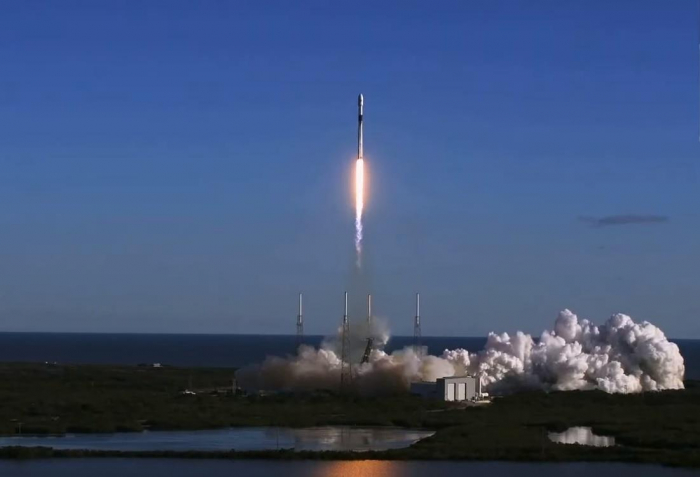The launch was originally scheduled for 18 December in Cape Canaveral, Florida, but weather conditions and technical issues forced the launch to be postponed four times.
It is the first time Elon Musk's private space firm has launched a satellite for the US military as part of an $83m (£65m) contract with the air force.
The lucrative military satellite market was previously dominated by Boeing and Lockheed Martin. However, SpaceX successfully brought a lawsuit in 2014 to open it up.
The spy satellite – nicknamed Vespucci, after Italian explorer Amerigo Vespucci – will join the air force's current constellation of 31 operational GPS satellites.
"Launch is always a monumental event, and especially so since this is the first GPS satellite of its generation launched on SpaceX's first national security space mission," said air force spokesman Lieutenant General John Thompson.
"As more GPS III satellites join the constellation, it will bring better service at a lower cost to a technology that is now fully woven into the fabric of any modern civilisation."
Colonel Robert Bongiovi, launch enterprise director, added: “The first GPS III launch marks a significant milestone for the GPS constellation as well as our partnership with SpaceX. This launch demonstrated the successful teamwork and cooperation amongst all mission partners to deliver the capabilities our warfighter demands.”
SpaceX described the capabilities of its payload in its mission overview, noting the launch is "critical to national defence".
The SpaceX Falcon 9 rocket carrying the military satellite successfully launched on 23 December, 2018, from Cape Canaveral, Florida (SpaceX)
The space firm said: "The newest generation of GPS satellites is designed and built to deliver positioning, navigation, and timing information with three times better accuracy, and up to eight times improved anti-jamming capability."
Unlike recent SpaceX missions, no attempt was made to land the first stage of the rocket, despite Air Force officials initially hinting the launch might include a landing.
SpaceX will launch a minimum of four subsequent GPS satellites as part of its contract with the air force.
The Independent
More about: SpaceX
















































